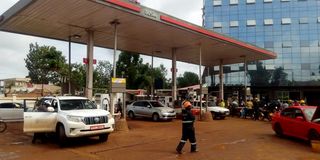Premium
Fresh fuel shortage: who’s fooling whom?

Ken Bowen, a supervisor at a petrol station in Iten waits for the next supply of fuel on April 25, 2022.
Less than 10 days since the government announced a triumphant end to the fuel shortage crisis, a growing number of petrol stations have already run empty, ushering in a fresh round of scrambling for the scarce commodity.
Acting Energy and Petroleum Cabinet Secretary Monica Juma announced a swift government victory over rogue oil marketing companies it had accused of deliberately causing the fuel shortage.

A deserted fuel station in Eldoret. Fuel shortage has been reported in most stations in the town.
“By yesterday April 18, 2022, the Ministry can confirm that majority of petroleum retail stations across the country were carrying out business as normal. The long queues witnessed in the past two weeks were gone, and normalcy in petroleum supplies was restored,” said the CS.
This followed the summoning of executives of 10 oil marketing firms to record statements at the Directorate of Criminal Investigations (DCI) over their alleged role in the shortage.
The firms were accused of withholding old fuel stocks to sell them at higher prices after the monthly review, as well as diverting their product for export beyond the recommended ratios, leaving the local market starved of fuel.
Oil firms are supposed to sell at least 60 per cent of their fuel products locally.

Fuel dealers in Busia says fuel shortage is as a result of prices from the oil shipping companies.
“We have determined that some players were hoarding the product, awaiting the ‘14th day of the month’ price review so as to cash in on the windfall. This speculative character [shows] not only bad faith but is insensitive to the situation that is upon Kenyans,” the CS said last week.
But no sooner had senior government officials completed their celebrations than the crisis reared its ugly head again, with fuel stations in parts of Nairobi, Nyanza, Western and North Rift reporting shortages.
Many petrol stations in towns such as Busia, Kisumu and Eldoret have closed shop, while others that still have the scarce commodity have seen long lines of customers waiting their turn to buy fuel.
Petroleum Principal Secretary Andrew Kamau could not be reached for comment on the genesis of the resurgent crisis.
However, an oil executive told the Nation that they had been gagged from speaking to the press on the back of the DCI summons and could not provide any more information on shortages.

Several filling stations in Migori County have run out of fuel with motorists turning to roadside retailers for the commodity.
“We have been barred from talking to the media and our phones are being monitored. But we can speak in future about what is really happening once this (fuel shortage crisis) is over,” said an executive.
But the Nation understands that large oil firms have turned against independent oil dealers who rely on them for their fuel by withholding their supply or selling to them at high wholesale prices.
This comes as global crude oil prices soar, pushing local prices to historic highs and prompting large oil firms to reduce their fuel purchases from the importer.
Independent oil dealers
This means the firms must prioritise supply to their franchised outlets, leaving independent dealers to their own devices. The latter make up about 30 per cent of Kenya retail fuel stations.
The Petroleum Outlets Association of Kenya (POAK), an industry lobby for dozens of independent oil dealers, said large dealers are no longer supplying them with fuel and prices have been hiked for the little they get.
This comes as the energy regulator has allowed oil companies to set their own wholesale prices, meaning this will cost small firms dearly.
This is despite the Petroleum Act, 2019 empowering the Energy and Petroleum Regulatory Authority (Epra) to set not only maximum retail prices but also maximum wholesale prices to keep the fuel retail chain sustainable.
“Although the Authority is supposed to issue a maximum wholesale price as well to protect small retailers, this has not been happening [and] has left us exposed to exploitation,” said POAK in a statement.
“At times, many of us have had to buy at pump prices to bring you fuel.”





